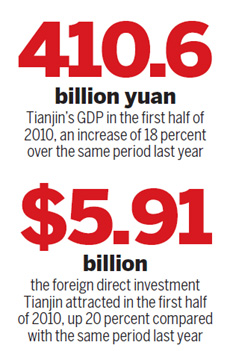News
Tianjin changes gear, charts green moves
By Xiao Lan and Wang Yu (China Daily)
Updated: 2010-09-13 11:52
 |
Large Medium Small |
TIANJIN- As China goes all out for a transition to a more sustainable growth, Tianjin, a major northern port city, has shifted its focus from economic expansion to growth model re-shuffling.
Its burgeoning Binhai New Area has vowed to veto all projects that fail to meet environmental standards.

"No projects would be permitted if they consume energy and emit pollutants more than the law allows," said Zong Guoying, head of Binhai New Area.
By next year, the Binhai area plans to cut its energy consumption per unit of gross domestic product (GDP) by 8 percent over 2009.
"Examining our development during these years, we find that top priority should go to transforming development pattern and restructuring the economy, so that fast growth momentum can be achieved, risks can be fended off and sustainable development can be available," Tianjin's Party Chief Zhang Gaoli said.
Tianjin's economy maintained a steady growth momentum in the post-crisis period. The city's industrial-added value increased by 27.5 percent year-on-year in the first six months of 2010, according to official statistics.
In the first half of this year, Tianjin's economy improved its recovery pace, with a GDP of 410.648 billion yuan ($60.7 billion), or an increase of 18 percent over the same period last year. Its year-on-year increase rate ranked second in all of China.
As of the first half of this year, more than 20,000 foreign enterprises had invested in Tianjin, with the accumulative overseas investment in place reaching $37.6 billion. More than a quarter of the Fortune 500 enterprises had set up their branches in Tianjin.
With aerospace and aviation, equipment manufacturing, electronics, petrochemical, bio-technology and modern pharmacy, alternative energy and new material, light industry and textile and national defense technology as eight pillar industries, Tianjin has become the most important modern manufacturing hub of north China.
In terms of its permanent population, the municipality's per capita GDP in 2009 reached 62,403 yuan, a year-on-year increase of 11.1 percent.



